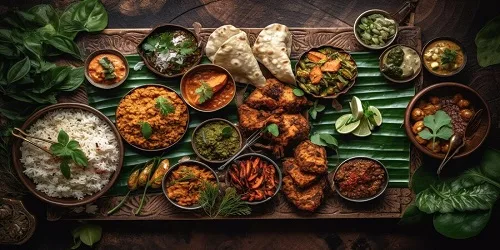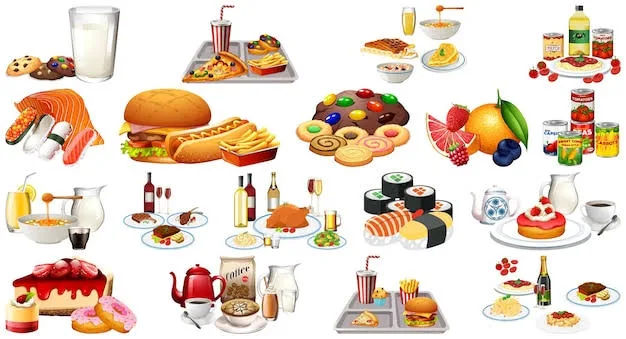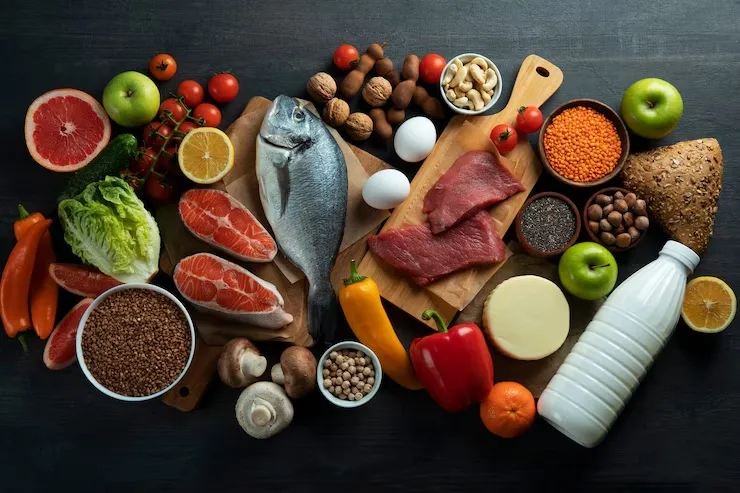
Food and drinks are essential parts of life, providing sustenance and enjoyment. There’s a vast world of culinary delights to explore, from regional cuisines to international flavors.
Food:
Basic Food Groups: A balanced diet incorporates foods from various groups to ensure our bodies receive the nutrients they need. These groups include:
Fruits: Provide vitamins, minerals, and fiber.
Vegetables: Rich in vitamins, minerals, and fiber.
Grains: A source of carbohydrates, fiber, and some vitamins and minerals. Whole grains are unprocessed and more nutritious than refined grains.
Protein Foods: Provide essential amino acids for building and repairing tissues. Sources include meat, poultry, fish, eggs, beans, and nuts.
Dairy Products: A good source of calcium for strong bones and teeth. Also provides vitamin D and other nutrients.
Global Cuisines: The world offers a rich tapestry of flavors and dishes. Here are a few examples:
Indian Cuisine: Known for its diverse use of spices, herbs, and regional variations. Popular dishes include curries, biryani, dosa, and samosas.
Chinese Cuisine: Features a wide variety of regional styles, with an emphasis on fresh ingredients, stir-frying, and noodles. Popular dishes include dumplings, noodles, and Peking duck. herbs and tomatoes. Popular dishes include lasagna, spaghetti bolognese, and pizza margherita.
Mexican Cuisine: Spicy and flavorful, featuring ingredients like corn, beans, chilies, and avocados. Popular dishes include tacos, burritos, and enchiladas.
Mediterranean Cuisine: Emphasizes fresh vegetables, olive oil, seafood, and whole grains. Popular dishes include hummus, falafel, moussaka, and paella.
Special Diets: People may choose to follow specific diets for various reasons, such as health conditions, allergies, or ethical beliefs. Some common types include:
Vegetarian: Excludes meat, poultry, and sometimes fish.
Vegan: Excludes all animal products, including meat, dairy, and eggs.
Gluten-free: Excludes gluten, a protein found in wheat, barley, and rye.
Ketogenic: A high-fat, low-carbohydrate diet that forces the body to burn fat for energy.
Drinks:
Water: The most essential drink, crucial for hydration and overall health.
Coffee: A popular beverage made from roasted coffee beans, known for its stimulating effect. [Image of Coffee drink]
Tea: Another widely consumed beverage made from brewed tea leaves, available in various types. [Image of Tea drink]
Fruit Juices: A good source of vitamins and antioxidants, but also contain natural sugars.
Smoothies: Blended beverages made with fruits, vegetables, yogurt, or milk, offering a healthy and refreshing option.
Soda: Carbonated drinks often high in sugar and may not be the healthiest choice.
Alcoholic Beverages: Drinks containing alcohol, such as wine, beer, and spirits, should be consumed in moderation.

Importance of a Balanced Diet:
Eating a balanced diet that incorporates a variety of foods from all food groups is essential for maintaining good health. It can help to:
Reduce the risk of chronic diseases like heart disease, stroke, and diabetes.
Maintain a healthy weight.
Improve energy levels.
Boost the immune system.
Promote overall well-being.
Remember:
Enjoying a variety of foods is part of a healthy lifestyle.
Focus on whole, unprocessed foods as much as possible.
Limit your intake of processed foods, sugary drinks, and unhealthy fats.
Consult a doctor or registered dietitian for personalized dietary advice.

